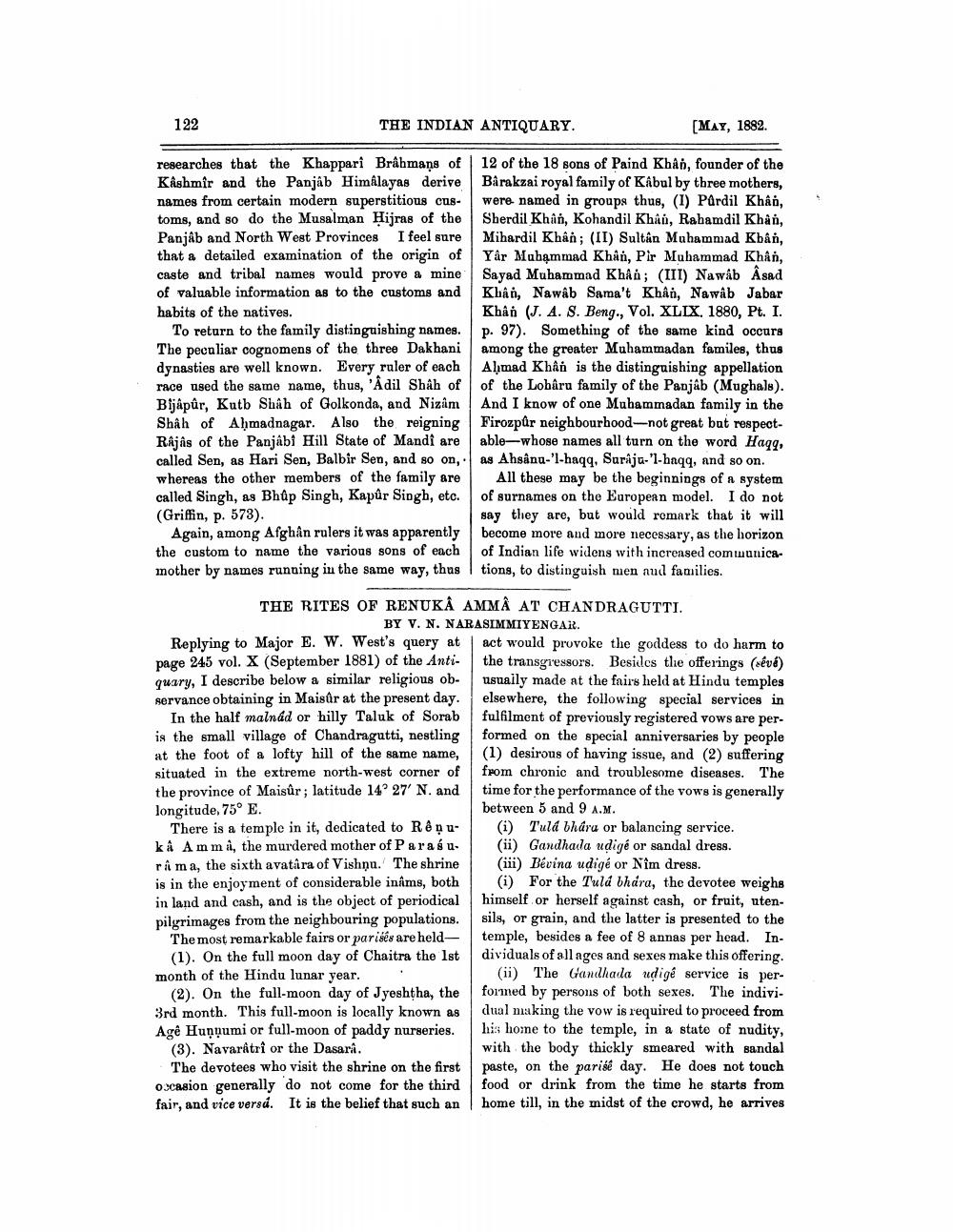________________
122
THE INDIAN ANTIQUARY.
researches that the Khappari Brahmans of Kashmir and the Panjab Himalayas derive names from certain modern superstitious customs, and so do the Musalman Hijras of the Panjab and North West Provinces I feel sure that a detailed examination of the origin of caste and tribal names would prove a mine
of valuable information as to the customs and habits of the natives.
To return to the family distinguishing names. The peculiar cognomens of the three Dakhani dynasties are well known. Every ruler of each race used the same name, thus, 'Adil Shah of Bijapur, Kutb Shah of Golkonda, and Nizâm Shah of Ahmadnagar. Also the reigning Rajâs of the Panjabi Hill State of Mandi are called Sen, as Hari Sen, Balbir Sen, and so on, whereas the other members of the family are called Singh, as Bhûp Singh, Kapûr Singh, etc. (Griffin, p. 573).
Again, among Afghân rulers it was apparently the custom to name the various sons of each mother by names running in the same way, thus
THE RITES OF RENUKA
AMMA AT CHANDRAGUTTI. BY V. N. NARASIMMIYENGAR.
[MAY, 1882.
12 of the 18 sons of Paind Khân, founder of the Bârakzai royal family of Kâbul by three mothers, were named in groups thus, (I) Pârdil Khân, Sherdil Khân, Kohandil Khân, Rahamdil Khan, Mihardil Khân; (II) Sultan Muhammad Khân, Yâr Muhammad Khân, Pir Muhammad Khân, Sayad Muhammad Khân; (III) Nawab Asad Khan, Nawab Sama't Khân, Nawab Jabar Khân (J. A. S. Beng., Vol. XLIX. 1880, Pt. I. p. 97). Something of the same kind occurs among the greater Muhammadan familes, thus Aḥmad Khan is the distinguishing appellation of the Lobâru family of the Panjab (Mughals). And I know of one Muhammadan family in the Firozpur neighbourhood-not great but respectable-whose names all turn on the word Haqq, as Ahsânu-'l-haqq, Suraju-l-haqq, and so on.
All these may be the beginnings of a system of surnames on the European model. I do not say they are, but would remark that it will become more and more necessary, as the horizon of Indian life widens with increased communications, to distinguish men and families.
Replying to Major E. W. West's query at page 245 vol. X (September 1881) of the Antiquary, I describe below a similar religious observance obtaining in Maisûr at the present day.
In the half malnád or hilly Taluk of Sorab is the small village of Chandragutti, nestling at the foot of a lofty hill of the same name, situated in the extreme north-west corner of the province of Maisûr; latitude 14° 27' N. and longitude, 75° E.
There is a temple in it, dedicated to Rêņukå Amma, the murdered mother of Paras urama, the sixth avatara of Vishnu. The shrine is in the enjoyment of considerable inâms, both in land and cash, and is the object of periodical pilgrimages from the neighbouring populations.
The most remarkable fairs or parises are held (1). On the full moon day of Chaitra the 1st month of the Hindu lunar year.
(2). On the full-moon day of Jyeshtha, the 3rd month. This full-moon is locally known as Agê Hunnumi or full-moon of paddy nurseries. (3). Navaratri or the Dasarâ.
The devotees who visit the shrine on the first occasion generally do not come for the third fair, and vice versa. It is the belief that such an
act would provoke the goddess to do harm to the transgressors. Besides the offerings (sévé) usually made at the fairs held at Hindu temples elsewhere, the following special services in fulfilment of previously registered vows are performed on the special anniversaries by people (1) desirous of having issue, and (2) suffering from chronic and troublesome diseases. The time for the performance of the vows is generally between 5 and 9 A.M.
(i) Tulá bhára or balancing service. (ii) Gandhada uḍigé or sandal dress. (iii) Bévina udigé or Nîm dress.
(i) For the Tulá bhára, the devotee weighs himself or herself against cash, or fruit, utensils, or grain, and the latter is presented to the temple, besides a fee of 8 annas per head. Individuals of all ages and sexes make this offering. (ii) The Gandhada udige service is performed by persons of both sexes. The individual making the vow is required to proceed from his home to the temple, in a state of nudity, with the body thickly smeared with sandal paste, on the parise day. He does not touch food or drink from the time he starts from home till, in the midst of the crowd, he arrives




